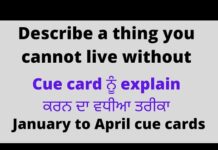Describe a story someone told you and you remember.
What the story was about?
Who told you this story?
Why you remember it?
And how you feel about it?
Introduction: 1
Well, I have read and heard many stories in childhood and I especially enjoyed listening to stories from my grandmother.
Who told the story?
And here I would like to narrate my favourite childhood story of a farmer who taught his sons the lesson of unity. One day I was having a fierce fight with my brother and at that time our grandmother told us this story of a farmer.
What the story was about?
There was a farmer having four sons who always used to quarrel with each other and the farmer was really worried about them. To teach them the importance of unity he brought few sticks and asked to break them into two. All sons immediately snapped the stick taking no time. Later the father gave a bunch of sticks to each of his to break and no one could break this time.
Then the farmer said dear sons if you will remain together no one can harm you else you will be like those broken sticks. Listening to the story we realized our mistake as sons of the farmer and felt sorry to our grandmother and promised we will never fight again.
Why you remember it? and How you feel about it?
I admitted listening to this story brought a huge change in our behaviour and developed our relationship. In fact, I have told this story later to my nephew and niece too.
Conclusion:
Overall, it is a story which is my favourite that I heard in my childhood.
Introduction: 2
- I have heard many stories in my life.
- I believe that storytelling is an art as old as civilization itself.
What the story was about? and Who told you this story?
- My grandmother used to tell me stories every night at bedtime.
- All her stories were fun to hear
- Some stories were fairy tales, some of princes and princesses and some were tales from the Panchtantra, which had animal characters in them.
- Most of her stories had some moral behind them
- Here I would like to talk about a story, which she told me many times.
- This is the story of the greedy dog.
- Once upon a time there was a dog
- He was very hungry.
- He wandered here and there in search of food.
- He got a juicy bone from a butcher’s shop.
- He felt very happy.
- He took the bone and ran away.
- He reached on a bridge of a river.
- He saw his own shadow in the water.
- He thought that there was another dog with a juicy bone in his mouth.
- His mouth watered and he wanted to snatch that bone from him.
- He started barking on him and as he opened his mouth, the bone fell down from his mouth in to the river.
- The dog lost his own juicy bone.
- He repented at his greed.
- But, alas nothing could be done.
Why you remember it? And how you feel about it?
- The moral of the story is that the greedy lose what they have.
- Greed is a curse.
- My grandma used to teach me values of life through these stories.
- Now, I tell these stories to my niece and nephew when they come to my place.
- They enjoy these stories a lot.
Introduction: 3
- I have heard many stories in my life.
- I believe that storytelling is an art as old as civilization itself.
What the story was about? and Who told you this story?
- My grandmother used to tell me stories every night at bedtime.
- All her stories were fun to hear
- Some stories were fairy tales, some of princes and princesses and some were tales from the Panchtantra, which had animal characters in them.
- Most of her stories had some moral behind them
- Here I would like to talk about a story, which she told me many times.
- This is the story of the greedy dog.
- Once upon a time there was a dog
- He was very hungry.
- He wandered here and there in search of food.
- He got a juicy bone from a butcher’s shop.
- He felt very happy.
- He took the bone and ran away.
- He reached on a bridge of a river.
- He saw his own shadow in the water.
- He thought that there was another dog with a juicy bone in his mouth.
- His mouth watered and he wanted to snatch that bone from him.
- He started barking on him and as he opened his mouth, the bone fell down from his mouth in to the river.
- The dog lost his own juicy bone.
- He repented at his greed.
- But, alas nothing could be done.
Why you remember it? And how you feel about it?
- The moral of the story is that the greedy lose what they have.
- Greed is a curse.
- My grandma used to teach me values of life through these stories.
- Now, I tell these stories to my niece and nephew when they come to my place.
- They enjoy these stories a lot.

Introduction: 4
I have listened to many stories, a few have remained etched in my memories.
What the story was about?
There is one story that imparted to me a valuable lesson of life. The story is about the power of compounding in our lives.
The story is about a king who organized a chess competition. And he asked the winner for the choice of prize. The winner requested the king to put one single kernel of wheat on the 1st square board. After that, he instructed the king to put the double of it on the 2nd square board. He further requested the king continue the doubling process for the rest of the 62 squares on the chessboard.
The kind thought that the prize winner had not made a prudent decision by asking for a low-value gift. And he ordered the minister of his kingdom to arrange wheat according to the formula prescribed by the winner.
To his surprise, the minister said the kingdom doesn’t have so much wheat, and further revealed that the quantity asked by the game-winner is not available in the whole world.
When the king calculated the probable quantity of the wheat, he realized the smartness of the prize winner.The quantity turned out to be Eighteen and a half million trillion kernels [18,500,000,000,000,000,000].
Who told you this story?
My father told this story to me when I was ten years old.
Why do you remember it? And how do you feel about it?
I remember this story because it tells us about the importance of compounding in our lives. Rather than going for big efforts, we should start small and increase our efforts on daily basis.
The small efforts we do regularly help us achieve outstanding results.
I feel good about this story because it brought a paradigm shift in my life. Whenever I have a new goal, I take a reference from this story and start small.
With time I increase my efforts and achieve good results.
Introduction: 5
Since my childhood, I have been listening to stories from my elders. When I was in 9th standard, I was going through challenging times. During that period, I heard a story, and the lessons learned from that story, are etched in my memories.
What the story was about?
The story was about good times and bad times in life.
Once there was a king who met a saint. The saint gifts a gold ring to the king and tells him to open the ring when he would feel too much happy or too much sad.
Once the king went to the forest for hunting. While chasing a tiger, he goes far from his military and gets lost in the jungle. During that time, the soldiers of another kingdom start chasing him. Fearing his life, he enters a cave, and the soldiers follow him there.
Seeing his death coming, the king gets upset. While thinking about the execution, his attention goes towards the ring given to him by the saint. He opens that ring and sees the message inside.
The message was “This too shall pass”.The king becomes confident after reading it and waits for the soldiers to go. After searching for a few minutes, the soldiers exit the cave. And the king comes back to his kingdom.
After spending a few days in his palace, he attacks the king whose soldiers had chased him and he captures the kingdom. He organises a big ceremony and invites the saint who gave him the ring. Once the saint reaches, the king tells him the whole story and says that he is very happy. After hearing this, the saint tells the king to open the ring and see the message again.
The moral of the story is that both good times and bad times are temporary because both follow each other.
Who told you this story?
My father told me this story.
Why do you remember it? And how do you feel about it?
I remember it because it motivates me to work hard during challenging times. Furthermore, it reminds me to remain humble during good times.
Introduction: 6
Although I have listened to numerous stories in my life, a few are etched in my memories. One such story taught me a lesson that I follow in my day to day life.
What the story was about?
The story is about a farmer who has four sons. His children used to fight over trivial issues. Seeing the attitude of his sons, the farmer tried to teach them by going beyond the conventional domain.
He brought a bunch of sticks and gave them to his sons one by one to break it.No one was able to break them because the bunch was strong. After that, he gave one stick each to his sons and told them to break it. They broke the individual sticks without much effort.
After that, the farmer told a lesson to his sons. The teaching was “United we stand and divided we fall”.
He told it clearly to his sons that if they will not work together peacefully, the circumstances would break them. On the other hand, working in collaboration will help them handle all the conflicts adroitly.
Who told you this story?
My father narrated this story to me when I was seven years old.
Why do you remember it?
I remember this story because it teaches a valuable lesson about life. We all tend to fight over unnecessary issues which do not help us. For a fruitful life, family members and friends should work in unison to solve the pressing problems.
And how do you feel about it?
I feel good about this story because it brought a paradigm shift in my attitude. Furthermore, the teaching of this story bridges the gap between the family members.
Follow up Questions
1. Has storytelling changed over a while?
In the contemporary epoch, there is a paradigm shift in storytelling, due to two reasons.
Firstly, there is a change in the family size. Earlier, a sizeable proportion of the population was living in joint families. Due to that, grandparents would narrate the stories to their grandchildren. However, nuclear families are in trend these days. Because of this, children do not get a chance to listen to stories from their grandparents. Moreover, in most cases, parents do not narrate the stories, due to a busy schedule.
The second change is due to the influx of technology, children prefer to watch stories in video or audio format, rather than listening to them from their near and dear ones.
2. Which way is better, traditional storytelling or the use of technology in storytelling?
Storytelling through technology looks unreal: moreover, it sounds monotonous. On the other hand, traditional storytelling looks consummate and people of all age groups like them.
3. Do you think that generally, most people are good at storytelling?
Storytelling is a mostly inborn art. Those who are good at it narrate the story consummately to woo the audience. Apart from this, their timing of pauses and cracking jokes is always perfect. Due to this reason, only a few people have the talent to narrate stories effectively.
4. What makes storytelling effective?
There are a plethora of ways through which we can make storytelling effective. First and foremost, the taste of the audience is of utmost importance. For example, when the audience is kids, we can narrate funny stories. However, in the case of a mature audience, the central focus of the narrator should be on subjects like politics, career, spirituality and stress management.
Moreover, in the contemporary epoch technology has made inroads in our lives. We can utilize it to make the storytelling effective. We can use videos and images from the internet to narrate the stories consummately.
5. Is it important to tell stories?
Yes, it is imperative to tell stories. Firstly, they help us to think beyond the conventional domain, Secondly, the lessons we learn from them help us to bring a paradigm shift in our lives. Lastly, by gaining valuable inputs from them, we can lead our lives towards an impressive growth trajectory.
6. Is reading books beneficial or watching documentaries better?
In my opinion, reading books is beneficial as compared to watching documentaries for two reasons.
Firstly there is more content in books than documentaries. A one-hour documentary is less effective than a book containing 300 pages.
Secondly, reading requires more concentration than watching a documentary. Due to this reason, readers fetch more information than those who watch documentaries.
7. Do young children like the same stories as older children?
There is a massive difference in the choice of younger children and older children for books. In the budding years, children thrive primarily on stories based on fantasies.
However, older children show more inclination towards stories related to science, space, technology and suspense.
8. How has technology changed storytelling?
There is no denying this conviction that technology has brought a paradigm shift in storytelling. People of the contemporary epoch thrive primarily on the internet for listening, reading and watching stories.
Moreover, due to wider connectivity people staying in any nook and corner of the world can get a story of their choice at the click of a button.
9. How do people tell stories to children?
People tell stories to children in a consummate manner. They always give a message at the end of the story to teach moral values to the younger generation. These teachings help them to lead their lives towards an impressive growth trajectory.
10. Why do children like stories?
Children like stories because through them they can think beyond the conventional domain.
Describe a story someone told you and you remember Describe a story someone told you and you remember Describe a story someone told you and you remember Describe a story someone told you and you remember Describe a story someone told you and you remember Describe a story someone told you and you remember Describe a story someone told you and you remember Describe a story someone told you and you remember







